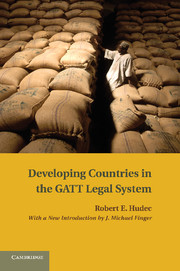Book contents
- Frontmatter
- Contents
- Foreword by Hugh Corbet
- Acknowledgments
- DEVELOPING COUNTRIES IN THE GATT LEGAL SYSTEM
- Introduction to the New Edition
- PART I A HISTORY OF THE LEGAL RELATIONSHIP
- PART II A LEGAL CRITIQUE OF THE GATT'S CURRENT POLICY
- 7 Basic Elements of the Legal Criticism
- 8 Separating Legal and Economic Issues
- 9 Impact of GATT Legal Policy on Internal Decision-making
- 10 Impact on Decisions in Other Governments: Non-reciprocity
- 11 Impact on Decisions in Other Governments: Preferences
- 12 First Steps Towards a Better Legal Policy
- List of References
- Index
11 - Impact on Decisions in Other Governments: Preferences
Published online by Cambridge University Press: 03 May 2011
- Frontmatter
- Contents
- Foreword by Hugh Corbet
- Acknowledgments
- DEVELOPING COUNTRIES IN THE GATT LEGAL SYSTEM
- Introduction to the New Edition
- PART I A HISTORY OF THE LEGAL RELATIONSHIP
- PART II A LEGAL CRITIQUE OF THE GATT'S CURRENT POLICY
- 7 Basic Elements of the Legal Criticism
- 8 Separating Legal and Economic Issues
- 9 Impact of GATT Legal Policy on Internal Decision-making
- 10 Impact on Decisions in Other Governments: Non-reciprocity
- 11 Impact on Decisions in Other Governments: Preferences
- 12 First Steps Towards a Better Legal Policy
- List of References
- Index
Summary
THE legal policy currently advocated by developing countries in the GATT contains two seemingly contradictory demands with respect to MFN treatment. The primary demand, reflected in the Enabling Clause, is that the MFN obligation should be set aside to permit preferential terms of entry for the products of developing countries – GSP preferences given by developed countries, GSTP preferences given by developing countries to each other and as much other preferential treatment as may be possible. The second demand, for those areas where preferential access is not given, is strict observance of the MFN obligation by developed countries – in other words, no discrimination against developing countries.
Developing countries argue that the two demands are merely different expressions of the same over-riding obligation to assist developing countries. The governments of developed countries appear to have accepted this position. They have subscribed to the Enabling Clause permitting preferential treatment, but they have never claimed that this exception weakens, in any way, their remaining obligations under the MFN clause.
As policy instruments to promote better market access, both demands made a good deal of sense. Political opposition to trade liberalization tends to be less when it is done on a preferential basis. Domestic industries have no reason at all to oppose so-called “trade-diverting preferences” (those that permit exports from developing countries to displace exports from other countries) because by definition such preferences have no competitive effects on domestic producers.
- Type
- Chapter
- Information
- Developing Countries in the GATT Legal System , pp. 174 - 187Publisher: Cambridge University PressPrint publication year: 2010



